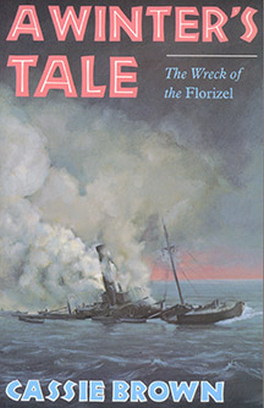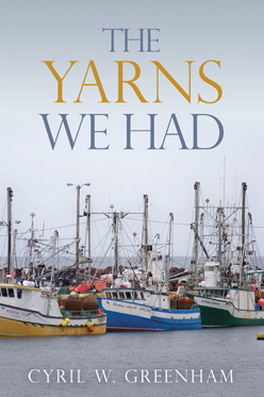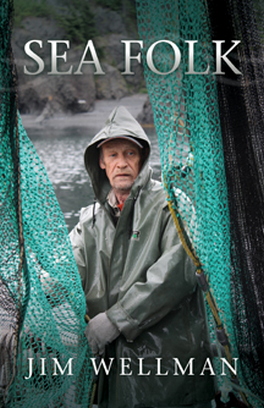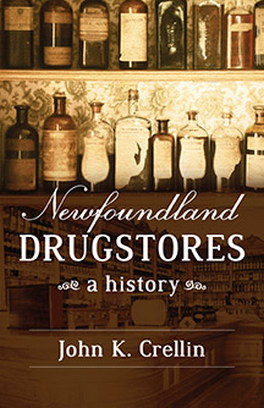In 1932, outport Newfoundland was rife with poverty. The many small communities that dotted the Great Northern Peninsula were particularly vulnerable to hunger and disease. When two brothers from Englee were suddenly stricken with typhoid fever, a call was put out to the Grenfell Mission in St. Anthony. Carl Hammerstrom, a young American doctor, answered the call and travelled to Englee to take the two men back to St. Anthony for treatment. The young doctor would face his greatest challenge yet when the ship he and his two patients were travelling on became storm-bound on the Grey Islands en route to St. Anthony. Time grew short for the two patients, and the doctor feared they would die before rescuers could come.
When Bells Toll in the North
by Freeman B. Cull
The first thing their mother noticed was that her sons weren’t in their usual talkative mood. Not that it was likely, but she wondered to herself if they had had a falling-out during the day.
“Maybe they broke Leonard’s new bucksaw,” she reasoned to herself. “I’ll find out,” she whispered as she began putting supper on the table. This mother, like all mothers, had her own ways of getting things out of boys.
“How much wood did you two cut today?” the woman in the long dress asked. Not only was the dress long, but it was the only one she had. This was her Sunday dress, as well as her weekday attire. The only difference about Sunday was that the dress was washed on Saturday evening. She had to have it clean for the Lord’s Day. She had a petticoat that she wore while washing her only dress.
“I hope you cut some dry wood today,” she continued. “I’ve had my hands full here all day trying to keep the fire going. I’m tired of picking up chips. I baked bread today, as you can see. And it’s gone dunce. The fire went out several times and the bread sunk down. My bread’s bad enough anytime, but with wet wood it’s even worse.”
The woman took up a large plate of steaming new potatoes, turnip and cabbage. She added a sizable piece of salt beet from the boiler. Taking her knife, she cut the meat into small pieces. If you wish to serve a Newfoundlander a meal that hits the spot, serve him Jiggs’ dinner. After a day in the woods, the brothers’ mother knew what they would make short work of when it came to food.
“Supper’s ready, boys,” she called. “Wait a minute until I light the lamp. It’ll only take a minute. I had it filled with oil this morning. The evenings are getting shorter every day now, and it’ll soon be winter.”
Neither of the boys spoke or even moved to sit in to the tempting meal their mother had prepared.
“What’s wrong with you two this evening?” she inquired. “You haven’t been talking at all since you came in the door. I can’t believe you two had a falling-out. Did you? I saw Ethel Canning today, over at the store. She came along and spoke to me, as if I knew Mr. Alex has been walking her around the harbour!”
Alexander looked up quickly and smiled. But when Ambrose made no reply or struggle to smile, his brother let his head fall again.
“Well, sit in anyway,” their mother said. “I’ve got a very good supper for you, and I’m sure both of you are half-starved. I’m well aware of how you two work yourselves to death. I’ll say you could probably eat a horse today, much less a small piece of salt beef and pradies.”1
The boys walked to the table and seated themselves. Their mother bowed her head and prayed.
“Lord, bless this food which now we take; and feed our souls with the bread of heaven. For Jesus’ sake. Amen.”
It was Ambrose who spoke first.
“I doubt very much that Ethel Canning’s on Alex’s mind, Mom,” he said. “I’ll probably have to take her home tonight.” Ambrose forced a smile this time, which broke the ice.
“If you go near my girlfriend,” Alexander piped up, “I’ll saw your legs off with Len’s new bucksaw!”
“Now, boys, for sure you two haven’t been fighting over a girlfriend, have you?”
“No, Mom, we haven’t been fighting over a girlfriend – or anything else,” Alexander answered. “We’re both feeling sick, that’s all. I feel like I’m getting a fever, too. We had a very good day in the woods. The trouble is that we found a dog buried almost in the well where we got our drinking water from today. We used it for drinking and for tea, but we didn’t discover it until nearly two o’clock today. I saw it when we had our first lunch there, but we didn’t figure out what it was until we had eaten the second time. I saw some yellow fur, and when Ambrose checked it out he pulled out a dog’s tail. Someone had buried a dog next to the well, by Uncle John Lane’s winter tilt. That’s where we’re cutting our wood this year. We had around two hundred turns cut by our second lunch.
“Mom, I can’t eat supper.” Alexander pushed back the steaming plate of homegrown vegetables and salt beef. He picked up his chair and placed it next to the wood stove.
“I’m freezing, Mom,” he said, “and I think I have a fever, too. I feel like going to bed. I’m so miserable that if I don’t soon go, you’ll have to carry me. I’ll have no brother of mine walking Ethel home! But right now I’m almost too weak to walk into the room, much less walk as far as Levi Canning’s.” He was referring to Ethel’s father.
“Well, I’m feeling sick,” Ambrose said, “but I guess this makes more supper for me.” He dug in with his fork and began his feast.
In no time at all, Ambrose had consumed his large dinner plate of vegetables and salt beef, and reached for Alexander’s.
“I’ll say you were hungry,” the short, thin-faced woman remarked. “Dead dogs don’t spoil your appetite.”
“Well, I didn’t like the look of it,” Ambrose said. “But it has nothing to do with this food, so why should I refuse to eat? I drank the water, too. I think it’s just that it’s on our minds. I don’t think it made us sick.”
Alexander heard his brother’s remark, opened his eyes, and rolled over on the daybed.
“If you felt my face,” he said, “you’d know it wasn’t just my mind. Mom, come here and feel my face! I have a high fever. I’m sure I have.”
His mother left her plate and walked across the kitchen. She placed her hand on her son’s forehead. Her natural instinct and experience were as good as today’s thermometer. Pulling the lad’s shirt collar open at the back, she rubbed his wet hair and blew her breath on his head.
“I dare say you have got a fever,” she said. “You not only have a fever, but you also have some red spots on your neck, too. I don’t suppose you’re getting chicken pox or something. I’ll get a wet cloth now and put it on your face.”
Alexander made no reply.
His mother wrung the cold water from the faded face cloth. Doubling it, she placed it on his hot brow. His face was red and his breathing was heavy.
“Why don’t you just go to bed?” she asked with a sigh. “I’ll put extra blankets on the bed if you get too cold. Right now, you have a high fever, and you say you’re still feeling cold. Aren’t you?”
Alexander blew his breath over his forehead and rolled off the daybed.
“I’ll go to bed right now,” he said. “I don’t think I’ll want to move anymore tonight.”
Alexander walked from the kitchen to the bedroom. He pulled off his work pants and khaki shirt, revealing his begrimed long johns. He quickly jumped under the covers while his mother tucked him in. She again placed the cloth on his forehead. An uneasy feeling began to creep into her motherly instinct.
You poor boy, she thought.
By seven o’clock, Ambrose was of two minds on what to do. He had planned earlier to walk to the tickle bridge to see who was around. But as he put his hand on his face, he couldn’t help but think, Just maybe. He looked at the bedroom, then at his mother.
“Mom,” he said, “I think I’ll go to bed, too. I’m not sure this is all just in Alex’s mind, after all. I believe I’m getting a fever, too. Come here and check my face. I think I’ll call off my walk for tonight and crawl into bed as well. I’m starting to get tired, and I’m not like I was when we had supper.”
His mother, looking at her second son, walked to the daybed as she had done an hour before when Alexander had asked her to check his fever. Again there was no need for further questions. Ambrose was stricken with the same sickness.
Mrs. Fillier now had a change of heart. “Yes, my son,” she said to Ambrose, “you go to bed. I think you both have more than a cold.”
Ambrose repeated the earlier moves of his brother. He pulled off his myrrhy coveralls and rolled in next to Alexander. Little did he know what the next few days would bring.
Settling himself into a comfortable resting position, he couldn’t help but listen to Alexander’s breathing. It sounded so laboured that he too had to check him, as his mother had. He reached his hand and removed the face cloth from his brother’s forehead and rubbed his hand over his temple. It was too much to believe. The rising and falling of this artery, with the intense pulsation, caught his interest. Unable to rest, he called his mother.
“Mom,” he said, “come here.”
His mother came into the darkened room, and she could still see Ambrose half sitting up. He had his hand on Alexander’s forehead.
“Mom, you check Alex again,” Ambrose said as he took his hand away. “I can hardly believe a person can get so hot. He’s as hot as the stove. Also, the side of his face is rising and falling as if he has a heart in the side of his head! He’s breathing so hard that I just had to check on him. You don’t think Alexander will die, do you?”
The widow leaned in over Ambrose and placed the gentlest hand in the world on Alexander’s head. She too could hardly comprehend that a fever could come on so quickly and be so intense. Not knowing what to say, she picked up the face cloth and stood up again.
“I’ll wet the cloth again with cold water and put it on him,” she said. “He does have a really high fever.”
She walked out to the porch and took a dipperful of cold water from the wooden stave barrel, which would freeze to the bottom many times before the next spring. The cold wet cloth was placed on Alexander’s head.
“If Alexander isn’t any better by morning, I’ll have Baxter Gillard send a telegram to Dr. Grenfell at St. Anthony,” the woman said. “I’ve felt a lot of fevered brows in my years, but I can’t recall having felt one this hot.” Lowering her voice to a whisper, she said, “This is terrible.”
A story that you\\\'ll never forget!
-- Earl B. Pilgrim, author of Curse of the Red Cross Ring --



















